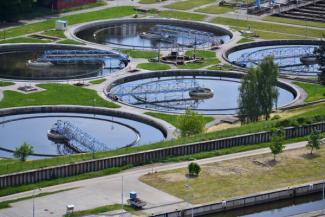World Bank Group Climate Toolkits for PPPs
The fiscal constraints of governments across the globe open the door to new opportunities and challenges to crowd in private sector solutions, innovation, and finance to create new solutions and pathways to meet Paris Agreement goals on climate change. Participation of the private sector in climate-smart investments and infrastructure is critical and public-private partnerships (PPPs) are among the key solutions. PPPs are critical because the public sector alone will not be able to fill in the infrastructure gap without mobilizing private sector expertise, innovative thinking, investment capacity, and finance. PPPs can be a challenge though, because climate change creates uncertainty— and it is hard to play with uncertain moving pieces within the framework of PPPs, which require a certain degree of predictability to attract investment and finance.
Climate Toolkits for Infrastructure PPPs
This toolkit aims to address this precise challenge by embedding a climate lens and approach into upstream PPP advisory work and structuring. If structured correctly, PPPs can increase climate resilience offering innovative solutions to address both mitigation and adaptation challenges. PPPs are able to provide well informed and well-balanced risk allocation between partners— offering long-term visibility and stability for the duration of a contract (often 25 or 30 years, sometimes even more), compensating climate change uncertainty through contractual predictability.
Here are some of the questions this toolkit helps answer:
-
How do we make the most out of PPPs and private sector participation while helping with climate change mitigation and adaptation?
-
How can we innovate to allow for optimal risk allocation and contractual predictability in an environment marked by uncertainty and the need for resilience to unpredictable scenarios?
The Public Private Infrastructure Advisory Facility (PPIAF), The Global Infrastructure Facility (GIF), and International Finance Corporation Public-Private Partnership (IFC PPP) Transaction and Advisory Services have joined forces to build upon best practice on a topic at the cross-roads of climate change, infrastructure, and private sector participation. It is a field in development with nascent expertise, in which there will be a great deal of testing and innovation ahead of us.
Building awareness and shifting mindsets are needed. Currently an insufficient focus is given to considering climate change in the framework of public-private partnerships (PPPs). For instance, the PPP tender selection criteria are currently ultimately based on the least cost approach, which may promote assets not resilient enough to withstand climate impacts. This may in turn even result in total asset loss with devastating effects on the economy and society. We need to help change this mindset and send the right signals for the private sector to innovate and participate in delivering climate smart solutions. This toolkit is indeed about providing solutions to public officials and their advisors on how to better align interests and incentives towards climate-smart investments and tap into the tremendous private sector financing capacity.
This toolkit is ultimately a call for action for decision makers, to push for bold initiatives so that infrastructure investments become a critical and steady pathway to achieve Paris Agreement and SDG commitments.
Sector Specific Climate Toolkits for Infrastructure PPPs
PPPs are powerful tools to balance risks between public and private stakeholders. These sectoral toolkits provide guidance for incorporating climate approaches into the early stages of PPP transactions and facilitating private sector investment for resilient, low-carbon infrastructure in developing countries.
Find more at the Climate-Smart PPPs section, or Download Climate Toolkits for Infrastructure PPPs and sectoral tookits for Roads, Renewables, Hydropower, ICT, Water Production and Treatment.
Sections






